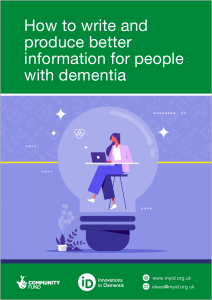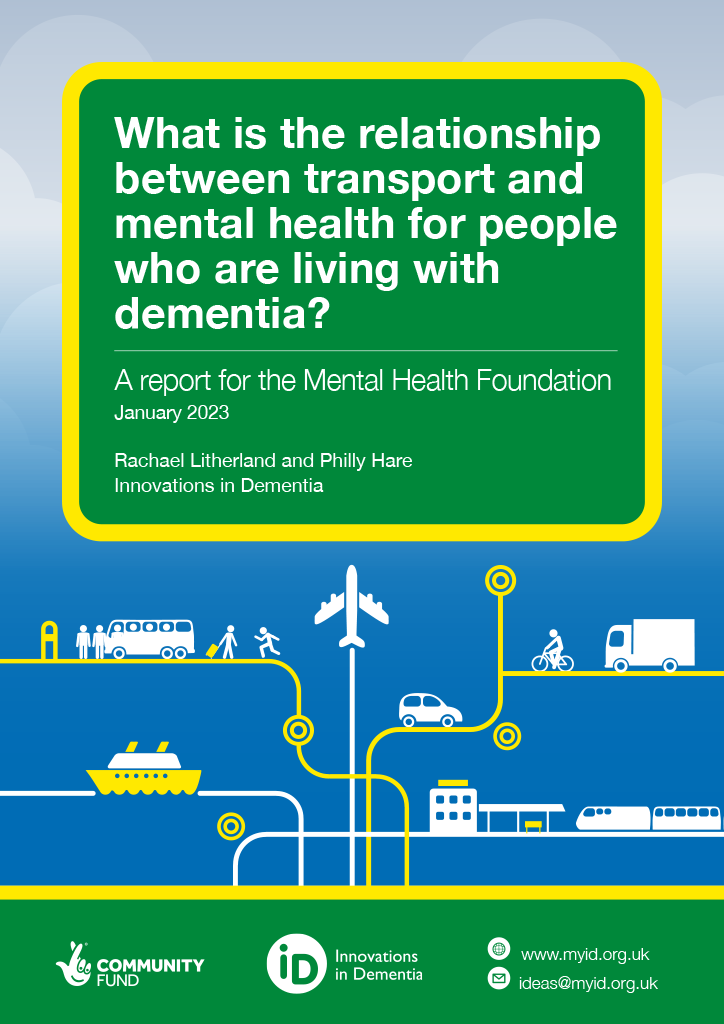
Accessibility
Since 2007 we have been thinking about and working on projects that aim to make the world in which we live more accessible for people with dementia.
We believe that while dementia can have a big impact on the way we function in the world – the world itself also throws up many barriers.
Examples of this would be poor signage, or information that is badly written or presented.
We believe that by removing these obstacles we can make the world an easier place not just for people with dementia but for all of us to live in.
How to write and produce better information for people with dementia
Dementia can have a big effect on the ability to read.
As reading becomes more difficult, our lives are diminished in many ways.
But how difficult does reading need to be? Or rather, how difficult do we need to make it?
People with dementia can read and process information much more easily if things are well written and clearly presented.
But it’s not just people with dementia.
Good writing for people with dementia is good writing for everyone.
Click here to download our guidelines
To find out more about how we can help you, contact Steve at: steve@myid.org.uk
Transport, dementia and mental health
People who are living with dementia frequently hight the importance of getting out and about in the community. They report that this enhanced their wellbeing, self-confidence, independence, social contact and stimulation. However, they also describe the stress and anxiety – and even trauma – that they experience if arrangements are not accessible or when things go wrong.
A group of people with dementia led a small research project to explore the relationship between transport and mental health for people who are living with dementia. This report includes their findings, as well as a review of key evidence.
How to provide the support dementia activists need
People with dementia tell us that the right support (or ‘scaffolding’) is vital if they are to be effective as activists for change. In this recorded discussion (December 2022) about dementia activism in DEEP, Tracey Shorthouse, and other members of DEEP groups in Kent, explore what this support involves. We also see some of the huge and wonderful banners that DEEP groups have created.
You can watch it below:
Audit checklists
These checklists will help you to look at your own buildings and outside spaces and identify changes you might make to make them easier for people with dementia to use.
Unfortunately many of us will also have experiences of buildings which are hard to find, in which you can’t work out where you are going when you get there, or which make us feel unsafe, uncomfortable or disoriented.
If so, you will remember how it made you feel.
…so if badly designed spaces make those of us without dementia feel anxious, lost and disoriented – the impact upon people with dementia can be profound.
Luckily, there is a lot that can be done to make environments easier for people with dementia to use.
Unsurprisingly, environments which are accessible to people with dementia also tend to be easier and more pleasant for everyone else as well.
These checklists will help you to look at your own buildings and outside spaces and identify changes you might make to make them easier for people with dementia to use.
They were produced in collaboration with Professor Mary Marshall and tested and refined by DEEP member groups SURF, EDUCATE and the East Kent Forget-me-Nots.
Checklist for OUTSIDE public spaces download pdf here.
Checklist for INSIDE public spaces download pdf here.
Crystal Clear – Helping you to get your message across
We can help you to create information that is easier to understand and gets your message across more clearly.
We work with people with dementia to produce information that is not just easier for people with dementia to use – but easier and more enjoyable for everyone to use and understand.
We have produced accessible information for clients including:
- The Department of Health
- Exeter University
- The European Foundations Initiative on Dementia
- The Design Council
- West Yorkshire Playhouse
- Hawker Publications
- Alzheimers Society
- Age UK
How to make your organisation more accessible
We can help you to make your buildings and services more accessible to people with dementia.
We work with people with dementia to audit services and buildings to make them not just easier for people with dementia to use, but for others too.
It is our experience that buildings and services which give thought to their accessibility to people with dementia are also more accessible, enjoyable and attractive to other people too.
We have worked with over 40 local and national organisations to help them become more accessible. You can read the guide we produced for local Age UK services here: https://bit.ly/3qWavFr
Dementia accessible communities
Since 2008 Innovations in Dementia has been at the forefront of work in the area of dementia accessible communities both nationally and internationally.
In 2008 we started to think about how information can be made more accessible, through our Start Making Sense project. This project worked with people with dementia to look at how the information we encounter, not just published information, but information in the streetscape and at transport hubs, can impact on us. While we weren’t able at the time to secure funding to continue the project, it sowed the seeds not just for our future work on dementia friendly communities, but also on developing a rights-based approach to dementia.
In 2010, the Department of Health asked us to find out from people with dementia what kind of barriers they faced in getting out and about in their communities. The report we produced “Dementia Capable Communities” was the first to articulate the aspirations of people with dementia and their carers in terms of staying connected to their communities in England. It identified the barriers that people faced, as well as some of the features that made communities easier to live in.
The report was launched at Department of Health event called “Big Society and Dementia”. While the broader impact of the “Big Society” concept is open to debate – the concept of what became broadly known as ‘dementia friendly communities’ was given a significant boost.
You can read this report here: DementiaCapableCommunities_summaryFeb2011.pdf
Over the next few years we worked on a variety of projects which enabled us to refine our thinking around dementia friendly communities, and hand in hand with that to begin to articulate a rights-based narrative.
In 2012 we produced for the Local Government Association a set of guide-lines for local and regional government which laid out what councils could do to make the communities they supported better places for people with dementia. The guidelines am with a set of practical tools which could be used to progress action at a local level. These tools were widely adopted and adapted for use in dozens of councils across the UK, as well as by regional and national dementia organisations in Australia and the US.
The LGA guidelines also laid out a conceptual framework for developing dementia friendly communities, called ‘the five domains’ that we, an others still use.
The guidelines were updated in 2015, and can be downloaded here: https://bit.ly/2uOuARv
During this period we also worked with Alzheimers Ireland to support them in the development of their DFC strategy – you can read more about that work here: https://bit.ly/2r3yyF7
The ‘five domains’ approach to building more accessible communities work for organisations and services too. Between 2012 and 2015 we worked with more than 60 local Age UKs across England to help them open up their mainstream service to more people with dementia. Using the Five Domains approach we were able to identify a range of low-cost high-impact solutions across a range of mainstream services.
You can read more about this work here: https://bit.ly/2qZ23sz
We also worked with other clients looking to improve their accessibility and work differently with people with dementia.
We worked with the Royal Albert Memorial Museum in Exeter on a new project to find new ways for the museum to involve and include people with dementia.
We worked with people with dementia to support the first Dementia Friendly Communities Conference at the West Yorkshire Playhouse in Leeds. With people with dementia from EDUCATE we conducted an audit of the venue and were able to make lots of suggestions for improvements. We also pro-vided practical and financial support for people with dementia to engage in the event itself.
Since 2012 we had been supported by and working with the Joseph Rowntree Foundation on its Dementia Without Walls programme – support dementia-friendly communities, strengthening the collective voice of people with dementia, and encouraging people to think differently about dementia. It was announced that from 2016, the legacy of Dementia without Walls will be carried forward in partnership with Innovations in Dementia.
In 2014 Steve was invited by Alzheimers Australia to deliver a speaking tour to 9 Australian cities, outlining the UK experience of dementia friendly communities and explaining our approach. You can see Steve’s presentation here:
In 2017 Steve started to work with Imogen Blood Associated on evaluations of DFC for the EU Joint Action on Dementia, and for Wigan Council.
You can read the Evidence Review on DFC for the EU Joint Action on Dementia here.
A quick word about language. Although in our early work we used the phrase ‘dementia capable’ – ‘Dementia Friendly’ is the phrase most often used to describe communities which are working to become better places to live for people with dementia.
People with dementia though have become increasingly uncomfortable with the idea that their inclusion in society depends upon and derives from the friendliness of others. For some, ‘dementia friendly’ smacks of beneficence, under which people with dementia connections with the outside world are at the whim go the largesse of others.
Many are now using the language of rights to articulate a different narrative about both their experience of dementia, and their place within their communities and broader society.
Just as people with physical disabilities saw barriers thrown up as much by the physical environment and the attitude of those around them as by their physical or sensory impairments – so people with dementia are increasingly conscious that there ARE thing that can be done to make it easier for them to stay connected to and active in their communities – and that they have a right to do so.
This is why we support those people with dementia who refer to use the term ‘dementia accessible’ communities. Its not perfect of course, and that’s not to say that using ‘dementia friendly’ is bad or wrong – its just that we want to help move the conversation on, and shifting the language where we can is one way to do that.
Other resources
Links to other resources on accessibility.
- Guide to a Dementia Friendly Community: Ideas for cross-sector and cross-generation initiatives, Japan… Read more
- Dementia friendly performances… Read more
- Venus, Mars and Dementia: Gender perspectives on dementia – report from the 2nd VERDe meeting… Read more
- Dementia Friendly Communities in Scotland Report 2 – The First Year April 2015 – March 2016… Read more
- Rural Dementia Top Tips… Read more
- Building a Dementia friendly community in Northern Ireland: learning from the DEED project in Derry… Read more
- Evaluation of the Bradford dementia friendly communities programme… Read more
- How to help people with dementia: A guide for customer-facing staff… Read more
- Dementia-friendly Yorkshire: First steps on the journey… Read more
- On the journey to becoming a dementia-friendly organization… Read more
- How can ‘positive risk-taking’ help build dementia-friendly communities?… Read more
- How can we make our cities dementia friendly?… Read more
- Evaluation of the York Dementia Friendly Communities Programme… Read more
- Creating a dementia-friendly York… Read more
- Dementia Diaries – Dementia friendly communities… Read more
- Vocal Flourish – a choir in York… Read more
- Good with people – The Co-operative working towards being Dementia Friendly – Alzheimer’s Society… Read more


